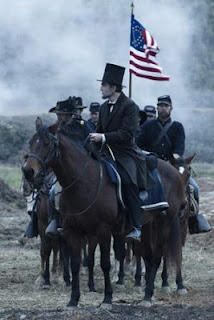Steven Spielberg's biopic on Abraham Lincoln, with the screenplay by Tony Krushner, offers a limited timeline on the life of the 16th president of the United States focussing on just the last four months of Lincoln's life. In the short period Lincoln sought to both end the incredibly destructive civil war with the Southern Confederate States whilst gaining the approval of Congress to pass an amendment to the US Constitution to formally outlaw slavery. Much of the film is devoted to the complicated dealing-making and legislative hurdles although the wheeling and dealing amongst the lawmakers provides fascinating and dramatic scenes. Daniel Day-Lewis provides a powerful and convincing interpretation of the very canny, almost folksy, Abraham Lincoln balancing a multitude of relationships, both personal and political, during arguably the greatest challenging period in the history of the United States. The film is largely set in the chambers of Congress and the White House with only occasional visits to the battlefield to meet General Ulysses S Grant and as a result, the story often risks falling into an almost airless atmosphere due to these confined settings. Some lighter moments are provided when Secretary of State William
Seward (David Strathairn) hires a trio of agents (John Hawkes, Tim Blake
Nelson and James Spader) to lobby for votes supporting the Constitutional amendment from possible waverers in Congress - proferring inducements but never bribes. This trio appears to be the precursor of the modern day lobbyist in Washington. On the floor of the House of Representatives, slave abolitionist lawmaker Thaddeus Stevens (Tommy Lee Jones) thunders away with provocative oratory against fellow lawmakers he deems to have questionable values.
Lincoln as a film has an excellent cast, dramatic script, high production values and provides some insight into this critical period of Lincoln's presidency. There are scenes of overt sentimentality which appear over contrived both for the characters and for the historical period in which the story is set.


No comments:
Post a Comment
Comments are very welcome but are subject to moderation.